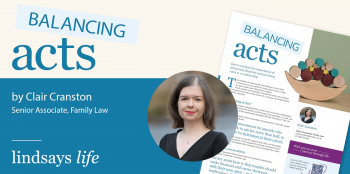Here are some key things to consider when telling your children you are separating or divorcing:
Ensure you are in control of your own feelings and emotions
You will probably experience a wide range of emotions as you progress through the process of separating from your spouse including fear, denial, anger, sadness and acceptance. In order to help your children you and your partner need to have thought through a strategy for how you are going to manage your emotions in front of them.
Decide if you are going to tell the children together or separately
It is better to tell the children together if possible. Sometimes parents may not agree on the reason for the separation or may be at different stages of acceptance. There can also be occasions where they may not feel that they can manage their own emotions if their spouse is present. If telling the children together is going to cause real difficulty then it may be better to do it separately.
Agree what you are going to say
Children need to hear the same message from both parents. Even if you are going to tell the children separately, parents should agree on what they are going to say. The explanation should be kept simple without allocating blame. Reasons such as “mum and dad will be happier if they live in different houses” are ideal.
Sometimes parents feel strongly that the children should hear the truth or may be committed to assigning the blame for the separation. This is not helpful as holding one parent responsible creates a confusing and difficult environment for children.
Tell the children how life is going to change for them
It is important to address the major concerns that children will have, such as when and how they will see each parent and where they will live and go to school. If they have questions that you are not able to answer then tell them that you are still working out the details and you will let them know as soon as you have an answer.
Focus on the key messages the children need to hear
It may seem obvious, but children need to be explicitly told:
- that the decision to separate is not their fault, it is not because of them or their behaviour and there is nothing they can do to try and make things better between their parents;
- mum and dad will both always love them and they can love both mum and dad equally;
- if mum is angry with dad they don’t need to be angry with dad and vice versa;
- adjusting to their new routine will be hard and you are sorry for the hurt the decision has caused to them;
- both parents will continue to be part of their life; and
- they will always have a family, but instead of being a family with one home they will now have two families, a family with mum and a family with dad.
Follow up
The first conversation should be straightforward and age appropriate. It is important not to bombard the children with too much information and it's very likely that the children will have more questions once they have had the opportunity to digest the news. Parents should give them the chance to have follow up chats. These don’t need to be formal or structured, children sometimes prefer to talk at bedtime, during mealtimes or while playing with a parent.
If you would like to discuss any separation or divorce matters please contact a member of our family law team.








